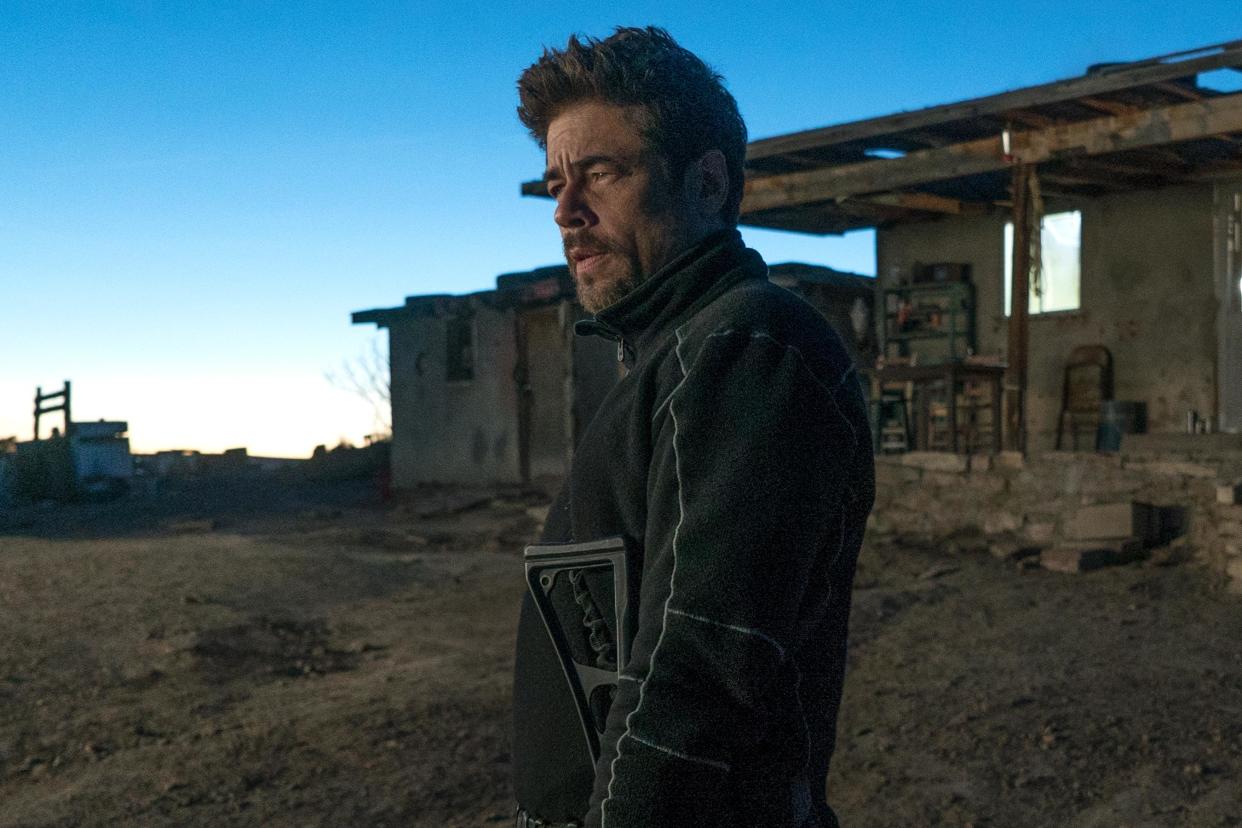Benicio del Toro on Trump's America and how 'Sicario 2' gives his assassin 'a conscience' (exclusive)

When Benicio del Toro first read the script for Sicario 2 he was unconvinced.
This early sceptism wasn’t because he felt that Taylor Sheridan’s follow-up to the critically acclaimed 2015 film was bad, far from it. He just couldn’t wrap his head around the changing motivations of his character, Alejandro Gillick.
The original movie saw Gillick, a former prosecutor-turned-assassin following the murder of his family, join a US government task force to help take down the leader of a brutal Mexican drug cartel. Though he had fleeting moments of being a good man, he could end the lives of children with as much ease as he ends the lives of adults.
This is the Gillick del Toro knew; a man without fear, without remorse, and without mercy when it came to doing the job.
“Here’s a character that we meet who is a serial killer, he’s a hitman,” the actor tells Yahoo Movies. “He kills a family, and we know that he’s like that because his wife and his daughter were killed in a drug cartel violence, but cut to this movie, he has to do a 180.
“For me as an actor, that’s impossible for me to do, I don’t believe it.”
Gillick’s U-turn concerns the young Mexican daughter of a drug boss ( played brilliantly by Isabela Moner) who is kidnapped by the CIA in order to start a war between her father’s cartel and a rival one. Unfortunately, a spanner is thrown into the works for him and the task force, led by his long-time associate Matt Graver (Josh Brolin), which leads the assassin on a transformative route that, according to Del Toro, “breaks the shell around his heart.”
“It gives him a conscience for him to make the right moral decision,” the actor says. “This is a guy we’ve seen kill a kid, so suddenly he’s saying ‘no’ but there are all these pieces…psychologically these pieces start affecting his head [and] when put together, I believe that a guy like Alejandro can [change] and disobey orders.”
The film has been praised for the way it delves deeper into the psyche and motivations of del Toro and Brolin’s characters, who both exhibit a vulnerability that wasn’t showcased in the original movie, but it also expands on the threats that face America.
The “war on drugs” was the primary landscape that featured in Sicario but Sheridan has added another few layers that seem to particularly play on the right-wing fears of Trump’s America: terrorism, immigrants and the Mexican border “crisis.” Of course, as del Toro explains, these fears are deep-seated in America’s turbulent history and have long been used by filmmakers as a backdrop that has subsequently created a specific film genre in itself.
“I believe that this issue of immigration, terrorism and the border, they precede Trump by decades,” the actor says. “In the movie, the border stuff, the migrant stuff, the terrorist stuff, they are used to set up this paranoia, just used to spook, and then the story goes in another direction.”

“The reason why these movies have become a [war on drugs] genre is so that storytellers can explore many aspects of the human condition: greed, vengeance, morality, loyalty, cruelty, good v evil, mortality, family, friendship, all that stuff. That’s the heart of this movie, the human condition.”
The movie has certainly come at a resonant time; the separation of immigrant children from their families at the Mexican border led to a global outcry with many in Hollywood, and across the world, protesting the horrific sanctions. Del Toro himself criticises the measures executed by the U.S. Immigration and Customs Enforcement (ICE).
“What is crazy is that during press for this movie we’ve had this big problem,” he says, “a real problem happening with these families being separated and treated like they are guilty before they are proven innocent when it should be the other way around.
“These kids are suffering.”
Sicario 2: Soldado is out on Friday
READ MORE
Tom Holland reveals Spider-Man 2 title
How to make it as a comic book writer
‘Luke Cage’ star wants Bushmaster to visit Okoye

 Yahoo Movies
Yahoo Movies 
